
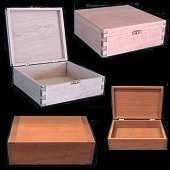
❈ Standard Lid w/ HingesThis type of box is constructed by gluing & clamping together all six sides at one time. The box is cut apart on a table saw. You determine how deep you want the lid and base. |
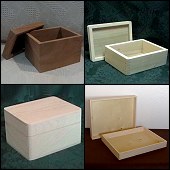
❈ Standard Lid / No HingesThis type of box allows for easy installation for hardware. Because there is no 'interlocking technique' used, hinges are needed to keep the lid on. |
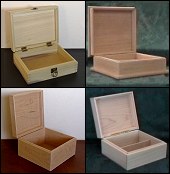
❈ Standard Interlocking Lid w/ HingesA popular design, this box is made so that the lid and the bottom section is cut to inter-lock for a nice, tight seal. For this box style, mitered and rabbet-butt joints work best.This image shows Walnut with Aromatic Cedar lining, Poplar with hardboard divider and Mahogany with overhanging lid and trim around the base. |
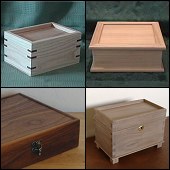
❈ Standard Recessed TopFor crafters interested in inlaying ceramic tiles, leathers or photos, the recessed box works well. You can alter the depth for the recessed area in the lid to accommodate the inlay product.Several variations can be added for this style, such as overhanging lid, trim around base. Contrasting wood splines add a decorative touch. |
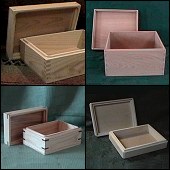
❈ Standard Lift-Off Lid / No HingesThis box style requires no hardware. The lid and the base interlock with each other using a rabbetting technique. Because there is no hardware, these are referred to as 'lift-off' lids. |
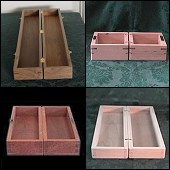
❈ Standard Lid - Top & Bottom EqualA standard lid box is cut directly in half making the top and bottom equal in height when opened. This style is good for boxes that need to lay out flat on a table, such as a gameboard. |
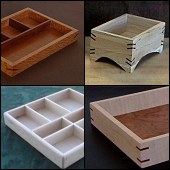
❈ Bottom Only / No LidThis is a 5-sided box - with no lid - often referred to as a tray box. This works well as a dresser valet, shadow box, trinket box, tray or basic storage. This image shows several variations to this style of box, including custom dividers, feet intergrated into base, splined-mitered joints for decoration, or cut-outs in the ends for use as a paper tray. |
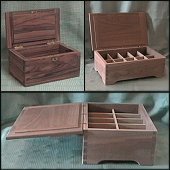
❈ ¾ Flat Interlocking LidThe lid consists of a ¾" piece of wood that has been cut to fit inside the bottom section of the box. This provides a tight interlocking seal. Because the edge of the lid is reduced to ½" this limits the type of hinge that can be used. Exterior mounted hinges do not work well. This type of box makes a great jewelry box. |
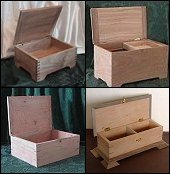
❈ ½" to ¾" Flat Lid BoxesThis style has a flat piece of wood for the lid often spliced together to achieve the desired width and to offer stability. Woodgrain veneer is often used for the lid. An overhanging lid, beveled or with a decorative routed effect works well to help 'grip' the lid for opening. |
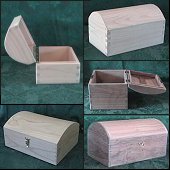
❈ Arched Lid BoxArched lid boxes require the use of flexible woodgrain veneer for the tops. There are many species of veneer available. Using 90° to 95° stop hinges, outside mount for interlocking styles, works to keep the lid upright. |
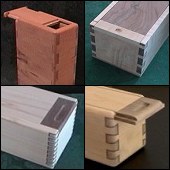
❈ Inside Slide Lid BoxThe lid of the inside slider travels along channels rabbetted into the inside walls of the box. Finger joints, mitered or rabbet-butt joints work well. The inside slider design can be used for small or large applications. and are a popular choice for presentation boxes for a thin item...like a journal. |
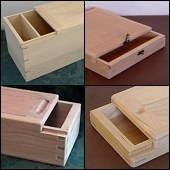
❈ Outside Slide Lid BoxThe lid of the outside slider runs along channels applied to the outside of the box. This gives the box a seamless apprearance when closed. Either mitered or rabbet-butt joints work best. The boxes in this picture: top images are Poplar with Dividers and Cherry with Hook Latch. The other two are Cherry and Birch ... each with a finger grip. |
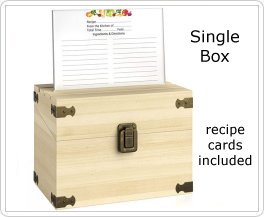
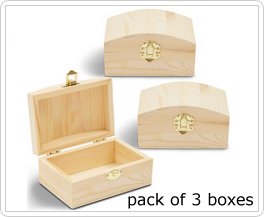
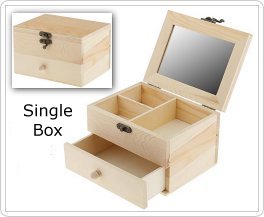
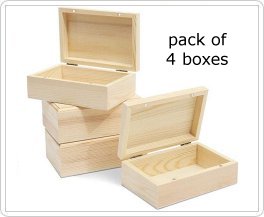
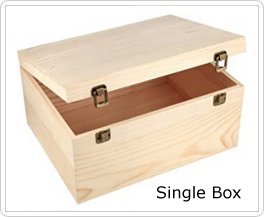
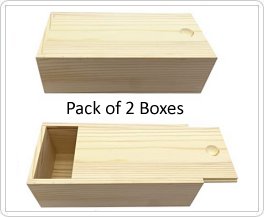


Features step-by-step, illustrated instructions for making over 70 joints, including mortise and tenon joints, dovetails, miters and more.